| Srl | Item |
| 1 |
ID:
120284
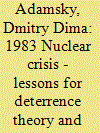

|
|
|
|
|
| Publication |
2013.
|
| Summary/Abstract |
This article distills insights for the scholarship of deterrence by examining the 1983 nuclear crisis - the moment of maximum danger of the late Cold War. Important contributions notwithstanding, our understanding of this episode still has caveats, and a significant pool of theoretical lessons for strategic studies remain to be learned. Utilizing newly available sources, this article suggests an alternative interpretation of Soviet and US conduct. It argues that the then US deterrence strategy almost produced Soviet nuclear overreaction by nearly turning a NATO exercise into a prelude to a preventive Soviet attack. Building on historical findings, this article offers insights about a mechanism for deterrence effectiveness evaluation, recommends establishing a structure responsible for this endeavor, and introduces a new theoretical term to the strategic studies lexicon - a 'culminating point of deterrence'.
|
|
|
|
|
|
|
|
|
|
|
|
|
|
|
|
| 2 |
ID:
120285
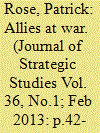

|
|
|
|
|
| Publication |
2013.
|
| Summary/Abstract |
This article compares the philosophy and practice of command in the British and US Armies during the Italian Campaign of 1943-44. It assesses pre-war influences on the command approach adopted by each army, and shows how refinements derived from wartime experience enabled British and American commanders to successfully utilise mission command principles to outfight the German Army in the latter years of World War II. This examination directly challenges the historical consensus that Allied commanders were disadvantaged by an inability to exploit the advantages of mission command, and that the German Army retained superior command practices, despite its other failings, throughout the fighting between 1939 and 1945. These conclusions hold additional relevance to modern military organisations which have emphasised mission command as the optimal solution to effective command in battle since the 1980s, but from an inaccurate understanding of German, British and American command traditions and experience that persists to this day.
|
|
|
|
|
|
|
|
|
|
|
|
|
|
|
|
| 3 |
ID:
120286
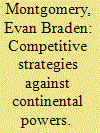

|
|
|
|
|
| Publication |
2013.
|
| Summary/Abstract |
This article makes three arguments about the Sino-American competition, the Sino-Indian rivalry, and the US-India partnership. First, past maritime-continental rivalries suggest that China will pose a greater challenge to American interests as it confronts fewer threats on land, while the US may require continental allies to counter-balance China's rise. Second, whereas a Sino-Indian continental security dilemma could benefit the US by compelling China to invest in capabilities that do not threaten it, a Sino-Indian maritime security dilemma could have the opposite effect. Third, Washington should consider India as a prospective continental ally rather than a potential maritime partner.
|
|
|
|
|
|
|
|
|
|
|
|
|
|
|
|
| 4 |
ID:
120288
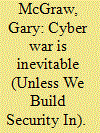

|
|
|
|
|
| Publication |
2013.
|
| Summary/Abstract |
The information systems controlling our critical infrastructure are vulnerable to cyber attack. Cyber war is therefore inevitable unless we improve our cyber defenses. The only way to do this is by building security into systems at the design stage.
|
|
|
|
|
|
|
|
|
|
|
|
|
|
|
|
| 5 |
ID:
120287
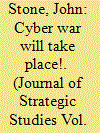

|
|
|
|
|
| Publication |
2013.
|
| Summary/Abstract |
The question of whether or not cyber war amounts to war per se is difficult to determine given strategic theory's uncertain grasp of the concepts of force, violence and lethality. These three concepts, along with their relationships with one another, are explored in order to demonstrate that cyber attacks can in fact be construed as acts of war.
|
|
|
|
|
|
|
|
|
|
|
|
|
|
|
|
| 6 |
ID:
120290
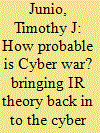

|
|
|
|
|
| Publication |
2013.
|
| Summary/Abstract |
Many well-established explanations for war suggest that cyber weapons have a greater chance of being used offensively than other kinds of military technologies. This response article introduces a research agenda for the study of cyber war, and offers an example - principal-agent problems in cyber operations - to demonstrate how rigorous theoretical and empirical work may proceed.
|
|
|
|
|
|
|
|
|
|
|
|
|
|
|
|
| 7 |
ID:
120292
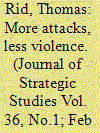

|
|
|
|
|
| Publication |
2013.
|
| Summary/Abstract |
A response to John Stone, Dale Peterson, and Gary McGraw on cyber war.
|
|
|
|
|
|
|
|
|
|
|
|
|
|
|
|
| 8 |
ID:
120289


|
|
|
|
|
| Publication |
2013.
|
| Summary/Abstract |
Deploying cyber weapons to damage Industrial Control Systems (ICS) is relatively easy because such systems are insecure by design. Maintaining communication with an activated cyber weapon, and ensuring its persistence, is harder but feasible.
|
|
|
|
|
|
|
|
|
|
|
|
|
|
|
|
| 9 |
ID:
120291
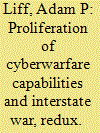

|
|
|